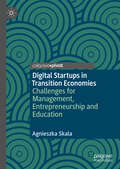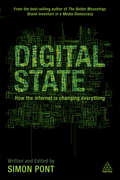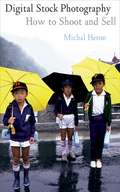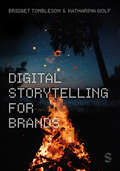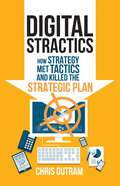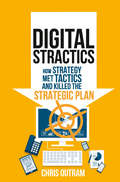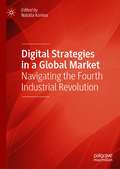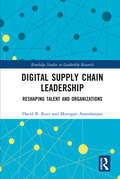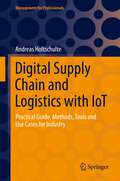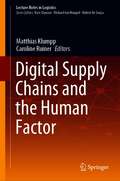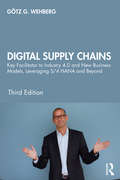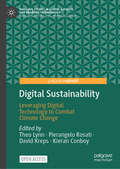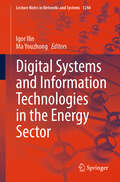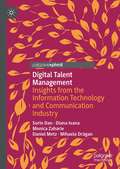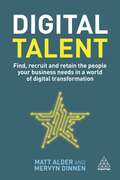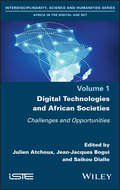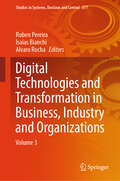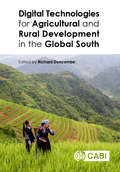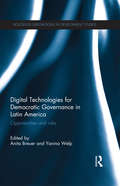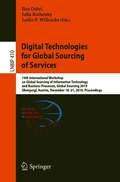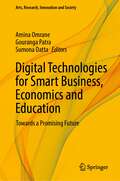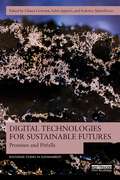- Table View
- List View
Digital Startups in Transition Economies: Challenges for Management, Entrepreneurship and Education
by Agnieszka SkalaThis book responds to the growing demand for a scientific approach to the concept of startups, which are a manifestation of the digital revolution and an innovation-driven economy. With a focus on digital enterprises, the author presents empirical research carried out over 4 years in collaboration with the Startup Poland Foundation, and provides a developed universal definition of a startup. This book highlights the necessity of a clear definition, in order for startups to be treated as a permanent economic phenomenon, rather than a temporary whim. Addressing the crucial need for an effective startup management methodology and more education on this form of entrepreneurship, Digital Startups in Transition Economies offers guidance for those researching entrepreneurship and innovation, as well as entrepreneurs, public institutions, startup accelerators and technology transfer centres.
Digital State
by Simon PontWhat is the Digital State? What is our Digital State of Mind? What does this Digital State mean for brands and for businesses? Big data, new distribution platforms, content collaboration, geo-targeting, crowdsourcing, viral marketing, mobile apps - the technological revolution has transformed the way society communicates and understands itself, and unleashed a whirlwind of new possibilities for marketers, as well as new risks. Mirroring the 'collaborative play space' Tim Berners-Lee first envisaged for the internet, Digital State brings together Simon Pont and 13 thought-leaders drawn from the worlds of advertising, marketing, media, publishing, law, finance and more, to explore what the digital age means for us as individuals, and the implications for the brands seeking to engage with us. Edited and part-written by Simon Pont, Digital State explores the possibilities and pitfalls of our digital age, an age where people can be brought together and new opportunities explored like never before.
Digital State: The Story of Minnesota's Computing Industry
by Thomas J. MisaAccounts of the early events of the computing industry—the Turing machine, the massive Colossus, the ENIAC computer—are well-told tales, and equally well known is the later emergence of Silicon Valley and the rise of the personal computer. Yet there is an extraordinary untold middle history—with deep roots in Minnesota. From the end of World War II through the 1970s, Minnesota was home to the first computing-centered industrial district in the world.Drawing on rare archival documents, photographs, and a wealth of oral histories, Digital State unveils the remarkable story of computer development in the heartland after World War II. These decades found corporations—concentrated in large part in Minnesota—designing state-of-the-art mainframe technologies, revolutionizing new methods of magnetic data storage, and, for the first time, truly integrating software and hardware into valuable products for the American government and public. Minnesota-based companies such as Engineering Research Associates, Univac, Control Data, Cray Research, Honeywell, and IBM Rochester were major international players and together formed an unrivaled epicenter advancing digital technologies. These companies not only brought vibrant economic growth to Minnesota, they nurtured the state&’s present-day medical device and software industries and possibly even tomorrow&’s nanotechnology.Thomas J. Misa&’s groundbreaking history shows how Minnesota recognized and embraced the coming information age through its leading-edge companies, its workforce, and its prominent institutions. Digital State reveals the inner workings of the birth of the digital age in Minnesota and what we can learn from this era of sustained innovation.
Digital Stock Photography: How to Shoot and Sell
by Michal HeronThis volume details how to create salable digital stock photos, covering style and the process of shooting, preparation, and editing and post-production. Other chapters discuss running a business, marketing, finding an agency, negotiating prices, copyright, and model releases and business forms, and one chapter contains 25 stock assignments and details on each. The volume is based on the third edition of How to Shoot Stock Photos That Sell, and some information has been revised and adapted. Other sections are new. Heron is a freelance photographer and the author of other books on the subject. Annotation ©2008 Book News, Inc., Portland, OR (booknews.com)
Digital Storytelling for Brands
by Katharina Wolf Bridget TomblesonDigital storytelling for brands has become a non-negotiable skill in the 21st century, due to the need to connect and communicate with diverse audiences across multiple channels and platforms. The ability to understand narrative(s) is now a prerequisite for many business, communication, marketing and public relations professionals, as well as content creators and journalists. This book teaches essential skills in deconstructing the traditional narrative and how to adapt narrative to fit contemporary platforms. Co-creative methods are emphasised and provide readers with a theoretical underpinning of participatory culture, and narrative. For the first time ever, this book brings together extant arts and humanities-based models with business theory. It provides learners with a clear understanding of the creative and persuasive form of narrative within a digital context, whilst building brand. Contemporary case studies highlight challenges faced in the digital world, including implications for reputation management, considerations associated with mis- and disinformation and the crucial role of the collective narrative. A key principle guiding this book is: ‘the more digital we become, the more we crave to feel human’ and it is this very space where digital storytelling can cut through the (digital) noise to provide an authentic connection. Bridget Tombleson is an academic at Curtin University, Perth, Western Australia, with more than twenty years’ experience in public relations and the communication industry. Katharina Wolf is an Associate Professor at Curtin University in Perth, Western Australia, and Lead of the Faculty of Business and Law’s public relations program.
Digital Storytelling for Brands
by Katharina Wolf Bridget TomblesonDigital storytelling for brands has become a non-negotiable skill in the 21st century, due to the need to connect and communicate with diverse audiences across multiple channels and platforms. The ability to understand narrative(s) is now a prerequisite for many business, communication, marketing and public relations professionals, as well as content creators and journalists. This book teaches essential skills in deconstructing the traditional narrative and how to adapt narrative to fit contemporary platforms. Co-creative methods are emphasised and provide readers with a theoretical underpinning of participatory culture, and narrative. For the first time ever, this book brings together extant arts and humanities-based models with business theory. It provides learners with a clear understanding of the creative and persuasive form of narrative within a digital context, whilst building brand. Contemporary case studies highlight challenges faced in the digital world, including implications for reputation management, considerations associated with mis- and disinformation and the crucial role of the collective narrative. A key principle guiding this book is: ‘the more digital we become, the more we crave to feel human’ and it is this very space where digital storytelling can cut through the (digital) noise to provide an authentic connection. Bridget Tombleson is an academic at Curtin University, Perth, Western Australia, with more than twenty years’ experience in public relations and the communication industry. Katharina Wolf is an Associate Professor at Curtin University in Perth, Western Australia, and Lead of the Faculty of Business and Law’s public relations program.
Digital Stractics: How Strategy Met Tactics And Killed The Strategic Plan
by Chris OutramIn the world of digital business, the line between strategy and tactics is blurring. Traditionally large companies would adopt strategic frameworks which planned over three- to five-year timescales, while most digital start-ups had little interest in comprehensive and rigorous strategic processes and simply set themselves vision and worked out how to get there along the way. In today's digital economy even large companies are finding that their planning horizons are being measured in months rather than years or quarters (if not yet in the weeks or even days of startups). On the other hand, investors are less swayed by the excitement of 'digital' and expect harder and more rigorous medium term planning from start-ups. As a result, while the empirical process of learning by doing is becoming part of traditional companies' strategy processes, digital pure plays are no longer just making it up as they go along, but actively learning and changing as they go along. In short: on the battlefield of online commerce, strategy blends with tactics. Indeed, the distinction between pure play and hybrid is increasingly redundant as more holistic business models begin to emerge. Digital Stractics captures the experience and insights of some 60 entrepreneurs, CEOs and chairmen of both pure plays and hybrids to formulate frameworks within which both pure plays and hybrids can shape their strategy and business models. As timescales between 'plan' and 'do' collapse strategy and tactics have to blend. The world of STRACTICS is upon us.
Digital Stractics: How Strategy Met Tactics and Killed the Strategic Plan
by Chris OutramIn the world of digital business, the line between strategy and tactics is blurring. Traditionally large companies would adopt strategic frameworks which planned over three- to five-year timescales, while most digital start-ups had little interest in comprehensive and rigorous strategic processes and simply set themselves vision and worked out how to get there along the way. In today's digital economy even large companies are finding that their planning horizons are being measured in months rather than years or quarters (if not yet in the weeks or even days of startups). On the other hand, investors are less swayed by the excitement of 'digital' and expect harder and more rigorous medium term planning from start-ups.As a result, while the empirical process of learning by doing is becoming part of traditional companies' strategy processes, digital pure plays are no longer just making it up as they go along, but actively learning and changing as they go along. In short: on the battlefield of online commerce, strategy blends with tactics. Indeed, the distinction between pure play and hybrid is increasingly redundant as more holistic business models begin to emerge. Digital Stractics captures the experience and insights of some 60 entrepreneurs, CEOs and chairmen of both pure plays and hybrids to formulate frameworks within which both pure plays and hybrids can shape their strategy and business models. As timescales between 'plan' and 'do' collapse strategy and tactics have to blend. The world of STRACTICS is upon us.
Digital Strategies in a Global Market: Navigating the Fourth Industrial Revolution
by Natalia KoninaThis book examines the impact of the Fourth Industrial Revolution on business strategy, marketing, management, sustainability innovation, and various kinds of industry. It provides a broad overview of ways that organisations have sought to develop a digital strategy, and explores the challenges and opportunities posed by a rapidly transforming digital world. It draws on European and Russian case studies, with chapters addressing smart cities, corporate governance, the digital single market, and agrobusiness. This book will be of interest to academics and practitioners in management and economics, who are interested in digital strategies performance in global markets.
Digital Supply Chain Leadership: Reshaping Talent and Organizations (Routledge Studies in Leadership Research)
by Murugan Anandarajan David B. KurzStrong leadership is necessary to drive the transformational change required to build and apply digital capabilities across organizations. Digital transformation in the supply chain is a leadership problem first and foremost. This book draws out some of the key digital business strategies supply chain leaders must become familiar with as they take on the responsibilities of leading transformations within their firms. The central rationale of the book is to establish a clear business case for the performance shifts and opportunities of the Digital Supply Chain. The benefits of a digital supply chain for firms can be summarized as uniquely reducing the amount of trade-off between costs and customer satisfaction. The challenges, complexity, and management involved in transforming to a digital supply chain have slowed many firms in their implementation. The key to unlocking this value and advantage is a new, robust, and digitally aware supply chain leadership mindset. It will provide readers with a practical Digital Supply Chain Leadership Road Map that will accelerate actions in technology, analytics, talent and business models. The road map to digital transformation will step the reader through these critical dimensions and illustrate how they can support their own organizational transformation by developing greater levels of maturity. This book will be most valued by supply chain leaders in medium to large scale organizations, as well as consultants and academics interested in digital business and supply chain transformation. The book will also be valuable for students studying digital transformation, supply chain, and operations.
Digital Supply Chain Leadership: Reshaping Talent and Organizations (Routledge Studies in Leadership Research)
by Murugan Anandarajan David KurzStrong leadership is necessary to drive the transformational change required to build and apply digital capabilities across organizations. Digital transformation in the supply chain is a leadership problem first and foremost. This book draws out some of the key digital business strategies supply chain leaders must become familiar with as they take on the responsibilities of leading transformations within their firms.The central rationale of the book is to establish a clear business case for the performance shifts and opportunities of the Digital Supply Chain. The benefits of a digital supply chain for firms can be summarized as uniquely reducing the amount of trade-off between costs and customer satisfaction. The challenges, complexity, and management involved in transforming to a digital supply chain have slowed many firms in their implementation. The key to unlocking this value and advantage is a new, robust, and digitally aware supply chain leadership mindset. It will provide readers with a practical Digital Supply Chain Leadership Road Map that will accelerate actions in technology, analytics, talent and business models. The road map to digital transformation will step the reader through these critical dimensions and illustrate how they can support their own organizational transformation by developing greater levels of maturity. This book will be most valued by supply chain leaders in medium to large scale organizations, as well as consultants and academics interested in digital business and supply chain transformation. The book will also be valuable for students studying digital transformation, supply chain, and operations.
Digital Supply Chain and Logistics with IoT: Practical Guide, Methods, Tools and Use Cases for Industry (Management for Professionals)
by Andreas HoltschulteThe concepts for Industry 4.0 and the Industrial Internet of Things (IIoT) will fundamentally change supply chains, production processes and industries. Intelligent technologies such as IoT, edge and cloud computing, big data, artificial intelligence and digital assistance systems are drivers of this change. This book provides a comprehensive overview of IoT use cases with illustrative practical examples of how digitization or innovation projects can be successfully implemented. It takes into consideration that processes are getting more flexible and efficient, and new digital technologies allow seamless, location-independent communication in near real time between things, processes and people through the digitization of physical objects and processes. Considering these changes, the book provides a guideline on how companies should position themselves for the future with industrial IoT in order to still play a decisive role in the industry in a few years' time. The book is aimed at both decision-makers and practitioners who, on the one hand, recognize the opportunities and possibilities for their company and, on the other hand, want to learn how to use the appropriate technologies. With this in mind it will be valuable for entrepreneurs, managers, architects and also developers in the field of Industry 4.0.
Digital Supply Chains and the Human Factor (Lecture Notes in Logistics)
by Matthias Klumpp Caroline RuinerThis book covers topics such as digitalization of production, operations, logistics and supply chains leading to new requirements for human capabilities and collaboration. The content is relevant for research as well as industry as digitalization is shaping all value chain processes anew. A special focus is directed towards an interdisciplinary perspective, including management science, economics, sociology, work science, computer science and psychology. In order to foster the dialogue between business practice and academics as well as university teaching and research, this contributed book is addressing academic as well as professional business views on digitalization.
Digital Supply Chains: Key Facilitator to Industry 4.0 and New Business Models, Leveraging S/4 HANA and Beyond
by Götz G. WehbergThis book provides a practical guide to digital supply chain modelling, demonstrating an agile approach to how such models can be applied to any manufacturing company to build competitive advantage, facilitate new business models and drive towards Industry 4.0. The agile approach of the book provides an attractive alternative to the conventional country-by-country deployment of S/4 HANA and other relevant technologies. This book contains the expertise Gotz G. Wehberg has amassed over 20 years as a senior partner in a leading consulting company, working across industries and with globally recognized clients, advising on digitization. In it, he explains the scientific roots of digital supply chain management such as holism, cybernetics, self-organization and evolutionary theory to inform a deep understanding that can drive a supremely innovative strategy for Industry 4.0. Beyond strategy, Wehberg introduces the practical tools and technologies used in supply chain modelling, for example, sensors, big data, artificial intelligence and the Internet of Things, as well as a reference framework that categorizes the technologies, together with the latest concepts and tools, such as DDMRP, predictive S&OP, pattern recognition, autonomous logistics and Lean. This framework supports decision making for developing supply chains in an end-to-end and cross-functional fashion, providing clear guidance for executives and managers on how to design supply chains for the future.
Digital Sustainability: Leveraging Digital Technology to Combat Climate Change (Palgrave Studies in Digital Business & Enabling Technologies)
by Kieran Conboy David Kreps Theo Lynn Pierangelo RosatiDigitalisation and environmental sustainability are two of the megatrends impacting industry and society. This open access Pivot is a timely exploration of some of the challenges and prospects related to digital sustainability from two main perspectives: how digital technologies can be used and maintained in a way that is environmentally sustainable over the long term (greening of digital technologies), and how digital technologies can be used to address climate change and improve environmental and sustainability outcomes (greening by digital technologies). The chapters included in this book are designed to provide some key definitions and concepts related to digital sustainability and its evolution, and more detailed insights on some of the key priority areas outlined in the European Green Deal, namely energy, mobility, buildings, food and the circular economy. A critical review of these topics will summarise and present different perspectives that challenge old assumptions and highlight emerging trends and possibilities for digital sustainability. Industry and society face significant challenges in the twin transition to digital and green transformation, not least of which is the need to balance investment in digital technologies with environmental sustainability. This open-access book can serve as a primer for scholars, policymakers, and enterprise decision-makers, providing insights on navigating innovation ecosystems to support both green and digital objectives.
Digital Systems and Information Technologies in the Energy Sector (Lecture Notes in Networks and Systems #1244)
by Igor Ilin Ma YouzhongDigital transformation and energy transition are undoubtedly the key trends of the last decade that are fundamentally changing the way countries, regions and the global community conduct their economic activities. At first glance, these are phenomena of completely different nature. The editors and authors of the book offer a closer look at the specifics of the development of each trend, the nature of their interdependence, analyze the possibilities of coexistence, and determine the potential effects of such technological symbiosis. The book is characterized by an original, interdisciplinary statement of the problem: description of various aspects of effective interaction between elements of energy and information-technology/digital infrastructures that jointly ensure information needs and compliance with energy efficiency requirements of the modern economy. At the same time, attention is paid to each technological trend separately, as well as to the possibilities of interaction between technological capabilities of energy and digital. International author teams of professionals in different fields offer an interesting perspective on certain aspects of modern technological development of various industries. The book will be of interest to both experienced researchers, undergraduate and graduate students, and practitioners, both energy and IT specialists and even mathematicians.
Digital Talent Management: Insights from the Information Technology and Communication Industry
by Sorin Dan Daniel Metz Diana Ivana Monica Zaharie Mihaela DrăganThis book highlights the importance of talent management practices in recruiting, developing and retaining talented professionals in the digital and IT&C industry. It unpacks the distinctive characteristics of ‘digital talent’ represented by a wide spectrum of professionals and managers with digital abilities, competencies and skills who add considerable value to organizations and industries worldwide. It shows that despite digital talent’s increased variety and significant contribution to digital transformation processes, much of the existing human resource and talent management research and practice fail to account for their distinctiveness. This book calls for the need for a new kind of talent management, referred to as ‘digital talent management’ (DTM) that is applicable to digital talent and decidedly integrates digital talent’s distinctive characteristics into talent management strategies and practices in a human-centered manner. Drawing upon existing, yet disconnected, streams of literature and empirical evidence derived from the information technology and communication (IT&C) industry, this book defines digital talent and delineates strategies to attract, develop and retain them for an uncertain and renewed future.
Digital Talent: Find, Recruit and Retain the People your Business Needs in a World of Digital Transformation
by Matt Alder Mervyn DinnenIn a disrupted and technology-enabled world of work, HR professionals' ability to attract, recruit and retain people with digital skills can be the difference between business success and failure.Digital Talent equips HR with the tools they need to assess what these critical skills are, how to attract the people who have them, keep these people engaged, productive and performing to the best of their abilities. It also provides crucial guidance on how to continuously develop employees, including leaders, to ensure that the organization has the skills it needs both for today and the future.This book provides advice on how to create new processes that are fit for purpose in the age of digital transformation, build inclusion when digital culture is becoming more prominent and use digital abilities effectively to maximise productivity while maintaining employee wellbeing. Digital Talent is the book on talent that HR , talent acquisition professionals and business leaders need to make sure that their people, and the business as a whole, stay ahead of the competition.
Digital Technologies and African Societies: Challenges and Opportunities
by Saikou Diallo Julien Atchoua Jean-Jacques BoguiThe integration and use of information and communication technologies (ICT) in African countries is increasingly observable in various sectors of activity (banking, education, trade, etc.) despite a digital divide still relevant. ICT has become a major sector of the recent growth of a new informal economy in African cities (Chéneau-Loquay, 2008). This question has been at the heart of various international meetings. An overall positive and even utopian momentum is generally heard about the contribution of digital technologies to the development of African states. The adoption or appropriation of digital technologies by Africans is presented in many speeches by politicians or institutions involved in the field of cooperation and international development as an important issue for the development of this continent. These different considerations give rise to reflections on the following themes. - Social Media and Public Space in Africa - Challenges of the digital economy in Africa - ICT and modernization of higher education in Africa
Digital Technologies and Transformation in Business, Industry and Organizations: Volume 3 (Studies in Systems, Decision and Control #577)
by Alvaro Rocha Ruben Pereira Isaias BianchiThis book covers research methods such as Systematic Literature Review (SLR) or Multifocal Literature Review (MLR), case studies, experiments, surveys, and Design Science Research using quantitative and qualitative approaches. This proposal is the third volume of the already edited and published book “Digital Technologies and Transformation in Business, Industry and Organizations.” Given the nature of this book proposal, linked with some Masters, and the faster pace of digital technologies evolution, the new version will have an entire new content with new cases and insights regarding the development and implementation of the most interesting digital technologies. Digital transformation marks a rethinking of how an organization uses technology, people, and processes in pursuit of new business models and new revenue streams, driven by changes in customer expectations around products and services. For many enterprises that build traditional goods, this means building digital products, such as a mobile application or an e-commerce platform. To do so, they must use and integrate digital technologies. The pace of change is increasing. Organizations need to adapt or risk disappearing under innovators entrance in the market. With new digital technologies growing in an exponential rate in the last few decades, organizations are facing even more complex contexts. Managers are now pressed to take efficient decisions. This book provides a reference manual to assist professionals and academics on further insights regarding: the impact of digital technologies in business, how to implement digital technologies, solutions for specific digital technologies barriers, and much more.
Digital Technologies for Agricultural and Rural Development in the Global South
by Amanda Caine Chris Clarke Richard Duncombe Peter Dorward Mukund Patil Gordon Gow Stefano Bocchi Fritz Brugger Amit Chakravarty Graham Clarkson Andrew Dearden Charlotte Jordan Linus Kendall Stan Karanasios Sumanth Kumar Luis Emilio Lastra-Gil Alberto Lubatti Andrea Porro Simone Sala Worlali Senyo Mira Slavova Luka WanjohiThis book shares research and practice on current trends in digital technology for agricultural and rural development in the Global South. Growth of research in this field has been slower than the pace of change for practitioners, particularly in bringing socio-technical views of information technology and agricultural development perspectives together. The contents are therefore structured around three main themes: sharing information and knowledge for agricultural development, information and knowledge intermediaries, and facilitating change in agricultural systems and settings. The book includes: -Views from diverse academic disciplines as well as practitioners with experience of implementing mobile applications and agriculture information systems in differing country contexts. -Case studies from a range of developing countries and information from across the public and private sector. -A set of practitioner guidelines for successful implementation of digital technologies. With contributions reaching beyond just a technological perspective, the book also provides a consideration of social and cultural factors and new forms of organization and institutional change in agricultural and rural settings. An invaluable read for researchers in international development, socio-economics and agriculture, it forms a useful resource for practitioners working in the area.
Digital Technologies for Democratic Governance in Latin America: Opportunities and Risks (Routledge Explorations in Development Studies)
by Yanina Welp Anita BreuerThis book is the first to comprehensively analyse the political and societal impacts of new Information and Communication Technologies (ICT) in a region of the Global South. It evaluates under what conditions some Latin American governments and people have succeeded in taking up the opportunities related to the spread of ICTs, while others are confronted with the pessimist scenario of increased, digitally induced social and democratic cleavages. Specifically, the book examines if and how far the spread and use of new ICT affected central aims of democratic governance such as reducing socio-economic and gender inequality; strengthening citizen participation in political decision making; increasing the transparency of legislative processes; improving administrative processes; providing free access to government data and information; and expanding independent spaces of citizen communication. The country case and cross-country explore a range of bottom-up driven initiatives to reinforce democracy in the region. The book offers researchers and students an interdisciplinary approach to these issues by linking it to established theories of media and politics, political communication, political participation, and governance. Giving voice to researchers native to the region and with direct experience of the region, it uniquely brings together contributions from political scientists, researchers in communication studies and area studies specialists who have a solid record in political activism and international development co-operation.
Digital Technologies for Global Sourcing of Services: 14th International Workshop on Global Sourcing of Information Technology and Business Processes, Global Sourcing 2019, Obergurgl, Austria, December 18–21, 2019, Proceedings (Lecture Notes in Business Information Processing #410)
by Julia Kotlarsky Ilan Oshri Leslie P. WillcocksThis book constitutes revised selected papers from the 14th International Global Sourcing Workshop 2019, held in Obergurgl, Austria, in December 2019. The 10 contributions included were carefully reviewed and selected from a total of 36 submissions.The book offers a review of the key topics in sourcing of services, populated with practical frameworks that serve as a tool kit to students and managers. The range of topics covered in this book is wide and diverse, offering various perspectives on the employment of digital technologies in the context of sourcing services. More specifically the book examines sourcing decisions and management practices around digital platforms, robotic process automation and blockchain, giving specific attention to digital aspects of innovation in sourcing.
Digital Technologies for Smart Business, Economics and Education: Towards a Promising Future (Arts, Research, Innovation and Society)
by Amina Omrane Gouranga Patra Sumona DattaThis book examines the application, challenges and opportunities related to the use of digital technologies in business, economics and education. In this context, the enclosed contributions identify the impact of artificial intelligence, machine learning, internet of things (IOT), computer vision, big data analytics and other advance technology in the area of business, economics and education. The book examines such themes as digital technology for smart business, the progress of the circular economy, the application of IOT in education, the use of drones in agri-business, business forecasting using smart technology, artificial intelligence in healthcare, among others.
Digital Technologies for Sustainable Futures: Promises and Pitfalls (Routledge Studies in Sustainability)
by Chiara Certomà Fabio Iapaolo Federico MartellozzoThis book critically examines the interplay between digitalization and sustainability. Amid escalating environmental crises, some of which are now irreversible, there is a noticeable commitment within both international and domestic policy agendas to employ digital technologies in pursuit of sustainability goals.This collection gathers a multitude of voices interrogating the premise that increased digitalization automatically contributes to greater sustainability. By exploring the planetary links underpinning the global digital economy, the book exposes the extractive logics ingrained within digital capitalism and introduces alternatives like digital degrowth and the circular economy as viable, sustainable paths for the digital era. Through a combination of theoretical reflections and detailed contextual analyses from Italy, New Zealand, and the UK—including initiatives in participatory planning and technology co-design—it articulates the dual role of digital technology: its potential to support socio-economic and environmental sustainability, while also generating conflicts and impasses that undermine these very objectives. Offering fresh insights into power disparities, exclusionary tactics, and systemic injustices that digital solutionism fails to address, this volume also serves as a reminder that sustainability extends beyond climate-related issues, underscoring the inseparability of environmental discourse from wider social justice considerations.Aimed at a diverse readership, this volume will prove valuable for students, researchers, and practitioners across various fields, including Geography, Urban Studies, Sustainability Studies, Environmental Media Studies, Critical AI Studies, Innovation Studies, and the Digital Humanities.
